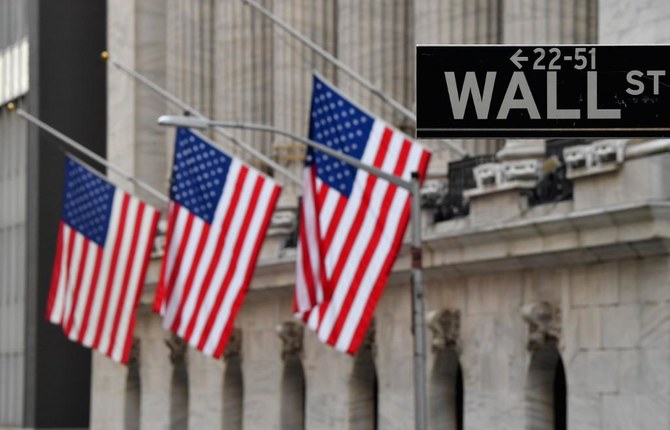WASHINGTON: Investors may have become overly complacent about financial conditions, creating the risk of a sharp downturn in markets, the IMF said Wednesday.
While policymakers must keep interest rates low to ensure economies recover from the COVID-19 crisis, they also must remain vigilant about potential problems, the IMF cautioned in the latest update to its Global Financial Stability Report.
“Financial stability risks have been in check so far, but we cannot take this for granted,” said Tobias Adrian, head of the IMF’s Monetary and Capital Markets Department.
With borrowing rates at record lows and new vaccines boosting hopes of a solid recovery in activity this year, prices for stocks, corporate bonds and other risky assets have risen globally, while markets have shrugged off new waves of coronavirus infections.
Adrian said the concern is that values have become “stretched,” pointing to the tech sector where “we’re detecting some frothiness.”
Technology companies have seen a huge increase in share prices, as many have benefitted from the pandemic and trends toward shopping online and working from home.
In US markets, the S&P information technology sector jumped 42 percent in 2020, while increases among major companies were stunning: Apple surged 82 percent, Amazon 76 percent, Facebook 33 percent and Google-parent Alphabet 31 percent.
Markets are “betting that continued policy support will offset any bad economic news in the short term and provide a bridge to the future,” Adrian said.
But the “disconnect between exuberant financial markets” and the lagging economic recovery “raises the specter of a possible market correction.”
The Washington-based crisis lender, which projects global growth will recover by 5.5 percent this year, has hammered home the message that governments should continue to provide as much economic support as possible.
“Reducing or withdrawing support at this stage could jeopardize the global economic recovery,” Adrian said.
However, policymakers must be watching for “unintended consequences” of stimulative policies.
“You want risk taking, but you don’t want excessive risk taking. Getting the balance right is really the goal of regulation that has to accompany monetary policy at all times,” he said in a press briefing.
While banks have sufficient capital and have maintained the flow of credit, that may change if institutions become concerned about debt levels or creditors’ abilities to repay loans, the report cautioned.
And Adrian said regulators must look not just at individual institutions, but at interconnections between banks – something that was missed in the runup to the 2008-2010 global financial crisis.
Global financial markets may be overconfident, IMF warns
https://arab.news/m47q7
Global financial markets may be overconfident, IMF warns

- ‘Financial stability risks have been in check so far, but we cannot take this for granted’
Closing Bell: Saudi main index closes in green at 11,382

RIYADH: Saudi Arabia’s Tadawul All Share Index rose on Tuesday, gaining 111.21 points, or 0.99 percent, to close at 11,381.83.
The total trading turnover of the benchmark index was SR6.37 billion ($1.70 billion), as 204 of the listed stocks advanced, while 56 retreated.
The MSCI Tadawul Index also rose, adding 13.85 points, or 0.91 percent, to close at 1,533.33.
The Kingdom’s parallel market Nomu gained 8.39 points, or 0.04 percent, to close at 23,749.38. This came as 30 of the listed stocks advanced, while 45 retreated.
The best-performing stock was East Pipes Integrated Co. for Industry, with its share price surging 9.94 percent to SR146.
Other top performers included Tourism Enterprise Co., which saw its share price rise by 9.93 percent to SR14.17, and Thob Al Aseel Co., which saw a 7.84 percent increase to SR3.99.
On the downside, Saudi Arabian Mining Co. was among the weaker performers, with its share price falling 2.64 percent to SR77.40.
Saudi Paper Manufacturing Co. saw its shares fall 2.54 percent to SR57.50, while Yamama Cement Co. declined 2.07 percent to SR27.40.
On the announcements front, Future Vision for Health Training Co. signed a two-year cooperation agreement with King Saud University aimed at strengthening links between academia and professional readiness.
According to a Tadawul statement, the partnership focuses on the joint development and execution of specialized training programs for university students, aiming to enhance their practical skills and employability.
The initiative includes coordinated efforts in training design, academic supervision, and program evaluation, with the goal of better preparing graduates for the labor market.
The agreement, which is renewable by mutual consent, is expected to start generating a positive financial impact in the second half of 2026. The company said no related parties are involved in the deal.
The company’s share price closed at SR7.30 on Nomu, marking a 1.39 percent decrease.














